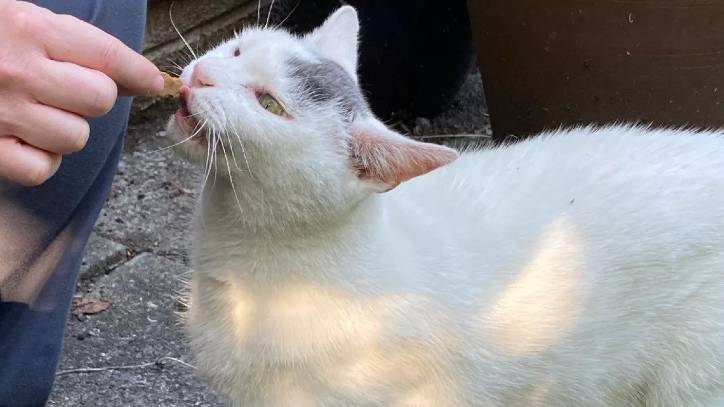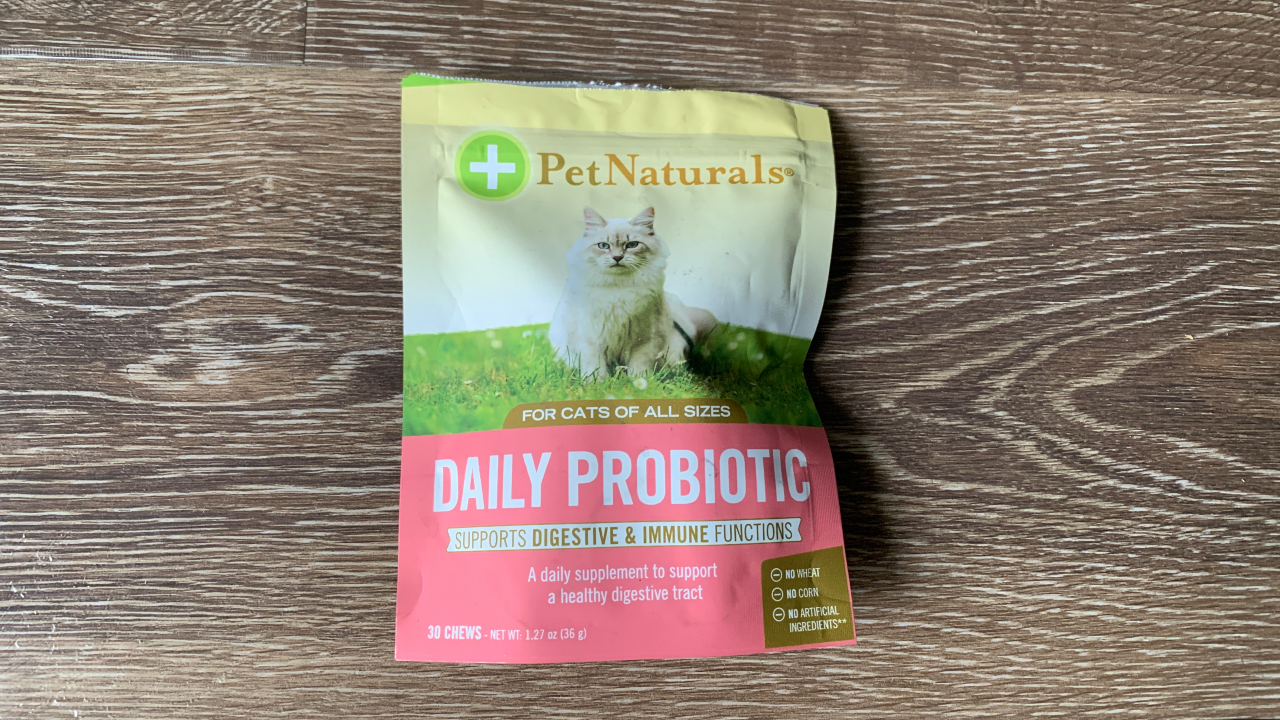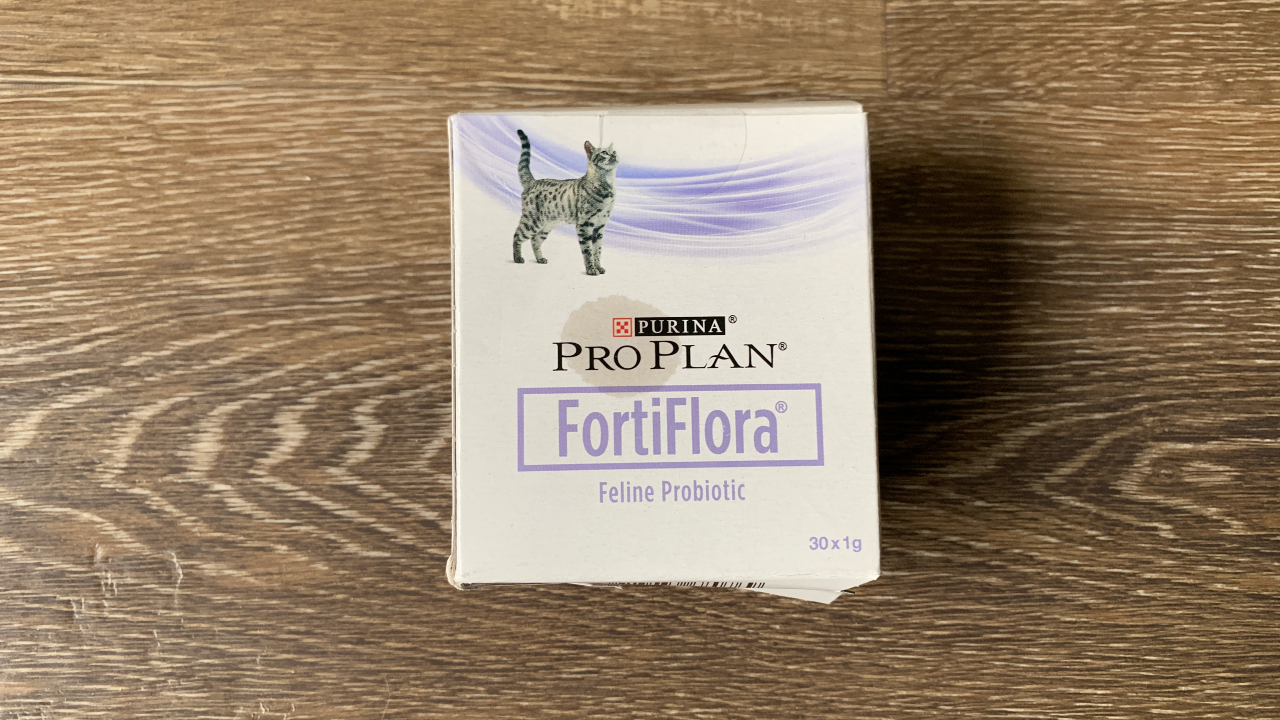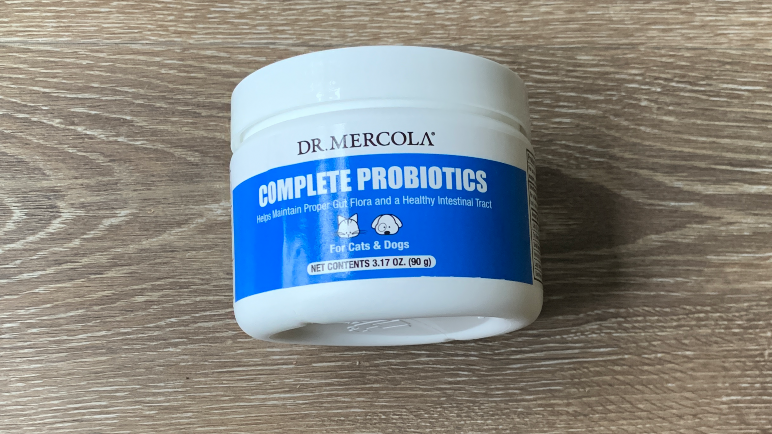I tried some probiotics for cats – here’s what happened
Did you know probiotics for cats exist? We find out if they are actually worthwhile feeding to a moggy

Probiotics for cats are more commonly used than some may think, with many feline owners including them in their cat’s diet to improve digestion and build better immune function. Similar to why humans take vitamins and supplements, probiotics for cats provide moggies with good bacteria.
Cats become part of the family and like children, kitty owners want to provide their pets with the best possible care to enhance their lives. This is why people will spend time and money hunting for the best cat food for allergies for their feline friends and if you want to go the extra mile for keeping your cat’s health in tip-top condition you should consider probiotics.
However, before you go looking for probiotics for cats and become inundated with various brands claiming to sell the very best option, you’ll probably want to know some more about what probiotics actually are and if they will actually benefit your kitty. As well as, what kind of probiotics is suitable for cats, can you use human ones? Can they treat diarrhea?
We’ve got all the answers to your questions below and we’ve even tried out three probiotics for cats on our own moggies to see how they respond to both. Read on to find out if probiotics for cats are all they’re hyped up to be…
What do probiotics do for cats?
Probiotics act in much the same way for cats as they do for humans. Since they contain live bacteria (of the good kind) as well as yeasts, they help to restore a natural balance in a cat's gut and this supports their digestive health.
Probiotics do this by ensuring the good bacteria will battle the bad. In doing so, it boosts the immune system which is largely located in the digestive tract and this means probiotics are particularly useful if cats have digestive ailments such as vomiting, constipation, diarrhea, changes in their stools or a decreased appetite.
What's more, according to a study, probiotics are also understood to play a role in alleviating inflammatory bowel syndrome – a common gastrointestinal disorder in cats. Supporting healthy gut microbiota therefore has many benefits and with better digestion and a supported immune system, your cat will feel healthier and happier.
Are probiotics good for cats with diarrhea?
Simple answer? Yes, probiotics are good for treating diarrhea in cats. They are also safe so you shouldn't feel wary of using them to help manage this condition. By promoting healthy gastrointestinal function, they will go a long way towards aiding conditions that can cause diarrhea such as inflammatory bowel syndrome.
Don't worry if your cat continues to suffer from diarrhea a few days after they begin to take probiotics, though. It takes a little time for the good bacteria to work their magic so this is perfectly normal. Simply persevere. At the same time, assess a cat's diet if diarrhea is becoming an ongoing problem.
First check the cat poop and check it against what's normal and recall if their eating habits have changed – changing cat food needs to be gradual whether you're feeding the best dry cat food or the best wet cat food.
Infectious disease such as viruses, bacterial infections and parasites can also cause diarrhea as can pancreatitis, thyroid problems or cancer. Never be afraid to seek assistance from your veterinarian if you're concerned, especially if you ever see blood in a cat's stool.
Can I give my cat probiotics for humans?
If you have human probiotics knocking around your home, you may be tempted to save the hassle of purchasing cat probiotics by offering them to your moggy. But don't do this! Although our digestive systems are not too dissimilar to cats, the simple fact there's no research into what human probiotics does to your feline companion should be enough to err on the side of caution.
But what if you've already given cats a human probiotic? Don't worry. It's unlikely they will have been harmed but it's best to stop doing so right away. If nothing else, you may also be introducing undesirable ingredients to your cat. Human probiotics also contain a higher dosage given the size of our bodies.
How much probiotics can I give my cat?
There are two ways of approaching this. You could identify a digestive problem in your cat such as diarrhea, constipation, acid reflux, or an upset stomach and start using probiotics to help balance the bacteria in their gut.
Alternatively, you could introduce probiotics as part of a cat's daily health routine which is a good way of heading off potential problems before they begin.
In terms of exactly how much you should give, it's always advisable to read the label on the probiotics you buy and follow the recommendations. After all, different probiotics come in different sizes and giving general advice is counterproductive.
There is absolutely no danger in giving probiotics daily, however, but if you feel your cat is getting a balanced diet and is healthy, you could give them less frequently. Talk to a vet for more advice.
We tested some leading probiotics for cats – here’s what we found

Pet Naturals Daily Probiotic for Cats
Best cat probiotic chews
Our feline reviewer, Nova, wasn't too sure about these chews at first. He sniffed at them, stuck out his tongue and licked the tiniest of corners then walked away, finding something else to occupy him – a far cry from his reaction whenever the fridge door opens and he believes he may get some chicken!
We left it in his bowl, however, and later that day it had gone. He was then more receptive to further chews, one of which is designed to be given every day, particularly during times of stress or if your cat is suffering from gastrointestinal distress. With tradesmen in the house, Nova did appear a little stressed and he seemed to have a bout of diarrhea. The probiotics helped with this.
As a bonus, these probiotics are as natural as possible. They taste of duck but they don't contain wheat, corn or artificial ingredients. They also have live cultures and prebiotic fiber (prebiotics feed friendly bacteria in the digestive system). So long as you can encourage your cat to eat them (and some other users report difficulties), you'll be making a good choice here.

Purina Fortiflora Veterinary Diets Feline Nutritional Supplement
Best cat probiotic powder for ease
When we were transitioning our cat to new food a while ago, we used Purina's Fortiflora to reduce the effects of stress. The idea is that you sprinkle the individual sachets of probiotic powder on to their food and it couldn't be easier – a good way to hide what you've done, especially if you give it a nice stir. Our cat had no trouble eating it.
According to the manufacturer this supplement works as well for kittens as cats and it contains meat and animal derivatives, minerals and nutritional additives such as taurine. It also has gut flora stabilizers, of course. This includes the lactic acid bacteria Enterococcus faecium SF68 which supports microflora balance and intestinal health.
As with other users, we found it to be highly effective. A bout of diarrhea is cleared up quickly and many cat owners say it's great for felines living with diabetes. You don't have to sprinkle the whole sachet, of course. You could go for half if you wish. But it's worth trying in any volume and it's highly recommended.

Dr Mercola Healthy Pets Complete Probiotics
Best cat probiotic for longevity
Unlike the Purina product, here you get a tub of probiotic powder so you need to use the scoop which comes inside the tub to measure out the amount you need and then sprinkle it on a cat's food. We found it wasn't anywhere near as convenient yet, at the same time, it's not as wasteful. You're not popping empty sachets in the bin here.
Intended for use once-a-day, the packet says you only need half-a-scoop if you're looking to give a maintenance dose (that is, you're just looking to keep your cat's gut healthy on an ongoing basis). It ensures that the tub will last quite some time although if you're looking to cure an ailment, you will need to double the dose.
If you have dogs in the house, you can use the probiotic for them as well although, in our mind at least, we'd rather a probiotic was aimed squarely at one pet or the other. But that's just us being picky. As it is, it's a handy tub to have around either because you want to ease gastrointestinal symptoms, reduce the effects of stress or just want to ensure your cat's gut is healthy.
Do probiotics actually work?
There is little doubt that probiotics are beneficial for cats. Research has suggested so and our hands on evidence seems to point towards the same conclusion. When our cat had a bout of diarrhea, probiotics also appeared to help. The important thing is that there is no harm in trying, so if you want to take the plunge yourself, you can rest assured that you'll only be doing good.
If you want to learn more about your feline friend's nutritional needs and whether a commercial diet ticks all the boxes, we recommend taking a look at our guide to ‘is homemade cat food better than store bought?’
PetsRadar Newsletter
Get the best advice, tips and top tech for your beloved Pets

David Crookes has been a journalist for almost 30 years and he has written for a host of magazines, newspapers, websites and books including the World of Animals Annual, BBC Earth, Live Science, The Independent and Tom’s Guide.
Born in England, he lives with two cats but he’s also keenly interested in the differences between the huge number of dog breeds – in fact, you can read many of his breed guides that he’s written in collaboration with vets here on PetsRadar.
With a lifelong passion for technology, too, he’s always on the lookout for useful devices that will allow people to keep their pets happier and healthier, and provide them more time to spend together.
David has a degree from Durham University, as well as postgraduate diploma in journalism from the University of Central Lancashire.
